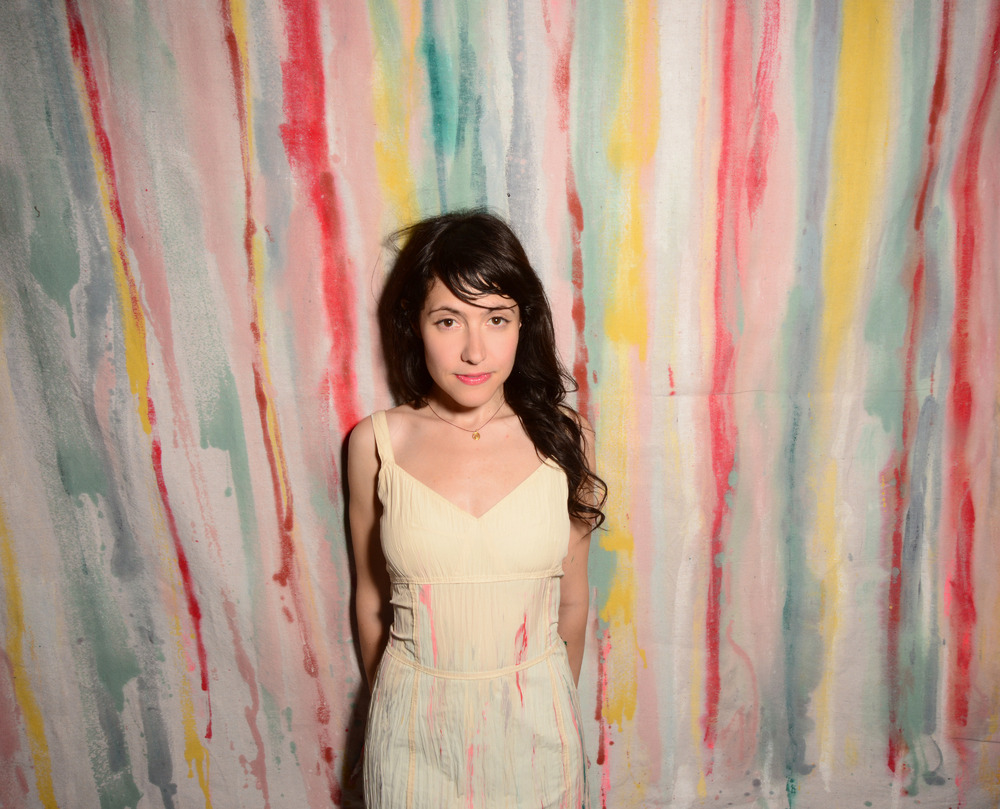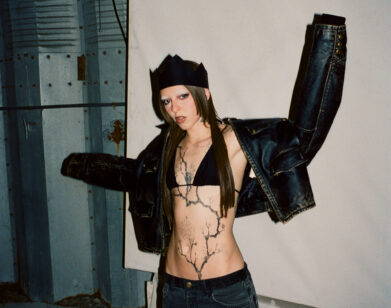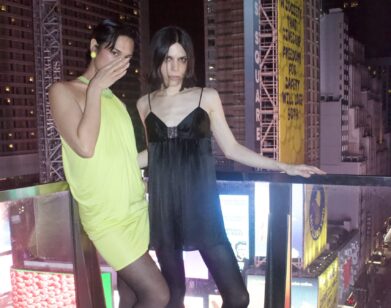The Arc of Elizabeth & The Catapult

ABOVE: ELIZABETH ZIMAN, AKA ELIZABETH AND THE CATAPULT
It seems that Elizabeth Ziman is constantly moving, working, creating. Since the last album from her band Elizabeth & The Catapult, 2010’s The Other Side of Zero, Ziman has toured with artists such as Greg Laswell, Lenka, and Kishi Bashi. She played drums in Kishi Bashi’s band. She worked with composer/songwriter/producer Paul Brill in scoring several films, including the 2012 documentary Knuckleball and 2013’s The Other Shore: The Diana Nyad Story. Yet she found time, after being dropped by record label, Verve Records, which released The Other Side of Zero, to record one album with her band, one solo piano LP, and an EP with singer-songwriter Richard Swift. The first of these, Elizabeth & The Catapult’s Like It Never Happened, will be released in January.
“I am one of those people, and maybe it has something to do with the fact that I’m from New York City, who really thrives off being busy,” says Ziman. “The busier I am, the more wheels are turning and the more I’m creating. For this record, I had something like two and a half years to write. I was choosing from 100 songs.”
Like It Never Happened benefits from all the best qualities Ziman has honed over her previous two albums with Elizabeth & The Catapult: the classical piano flourishes, the melodic vocal strength, the jazzy instrumental touches, the soulful presence. But for Like It Never Happened, Ziman also added a new weapon to her arsenal. Unlike her previous albums, Like It Never Happened was written on guitar, an instrument she recently taught herself to play while busking in the subways of New York.
Ziman took a few minutes to talk with Interview about her busy life, from her new instrument to her new albums, and the piano lessons she continues to give in her free time.
FRANK VALISH: When did you decide you were going to busk in the subways of New York to teach yourself guitar?
ELIZABETH ZIMAN: First of all, in New York City, you meet some pretty heavy-duty, amazing musicians in the subway. Some of the greatest musicians I know have been busking forever. I didn’t really decide to start busking until I was jamming with a friend of mine one day, who asked me to jam with him down in the subway, and I realized that the acoustics were incredible. It felt like I was singing in a church. I was on the G line in Brooklyn. There weren’t a lot of people around. When I started, very few people would be passing, and when they did pass they wouldn’t give me money. Once and a while, if I was lucky, someone would bless me. But I realized that it was my favorite place to play out of any of the venues or any of the places I have ever played. So I just kept coming back. And after about a year and a half of doing it, I could really write on my guitar. I always could play a couple chords, and I’ve written songs on guitar before, but I wrote this whole album on the guitar, and then the songs that I needed to move to piano, I did. But I got the whole skeleton for every song on the guitar. It was a cool twist of fate for me. It gave me more than I gave it. I was blessed more than I blessed the public.
VALISH: Did you find that the songs you ended up writing were different because they were written on guitar?
ZIMAN: I write a lot when I’m going somewhere, when I’m moving, if I am on tour in the van, or I am riding the train. I write my lyrics and melody first, together in my head, and then get to a piano and finish it up. All the best songs are lyrics and melody simultaneously written. Writing on the guitar just made it even more pure and elemental, just a basic song, keeping it really simple, and then if I wanted to add flourishes or make it more interesting harmonically, I would do that at a later date. Hopefully the songs are more direct and say more in fewer words. That’s always what I’m aiming for.
VALISH: Were there certain touchstones for you in learning the guitar?
ZIMAN: I quit studying piano when I was 13, pretty young. I was learning classical music, but I wasn’t listening to a bunch of classical records, necessarily. I remember I was listening to Ella Fitzgerald and I was listening to Nina Simone. My dad was pretty cool, so he was listening to [Thelonious] Monk and all this be-bop jazz. So I would listen to the records and would copy the piano line, copy what I was hearing and learn the melody. I didn’t start singing really until my 20s, and I wanted to sing like I spoke, because I had this naturally high voice, but I kind of wanted to belt, so I listened to people I wanted to sound like. Julie London. I’d listen to all the Julie London records, and I would literally sing back to her every line. I did that for about two years, and then I became a singer. For the guitar, I listened to all the Beatles stuff and I listened to Dylan, Joni Mitchell, and I just learned all the songs. Now instead of going to the subway, I just put it on the Internet. I go sit at the piano every day, because I got so bored waiting for my record to come out. So I go to the piano, and I pull up my iPhone and I play a cover or play a new song, basically every other day. Then I put it up on the web and I have a conversation with my fans about, “What should the title be? What do you think about this arrangement?” They’re so supportive and so excited about it. And just because of that, I went back into the studio a couple days ago and recorded a solo album. I was like, “Well this is working, and it pushed me to write more, so I might as well get these down.”
VALISH: Is that the live piano record you alluded to on one of your Facebook posts?
ZIMAN: Yeah.
VALISH: And you just hammered that out in a couple days?
ZIMAN: Actually in about four hours, because if you’re not arranging and the stuff is fresh and it feels really good, it feels like it was just born, that’s the best time to record. You’re capturing that moment, almost the moment of creation. You just wrote these songs, you’re excited about it, and you just do it. But that’s rare. The record I’m releasing in January, that’s a full band record, and that took three weeks.
VALISH: So do you hold on to this solo record now until a strategic time in the future?
ZIMAN: I’m not going to tell you what I’m going to do with it quite yet, because who knows? But I will say that there’s some exciting news regarding those recordings, and it will be a little treat for the new year.
VALISH: I wanted to ask about your social media involvement. I noticed, having liked your Facebook page, that you post regularly. Do you feel that’s helpful in terms of getting your music out there and interacting with people?
ZIMAN: There are so many reasons why I believe in doing things that way. One just has to do with the fact that the state of the business is so different right now. I don’t have a label. I have a distribution deal, with Thirty Tigers, and I’m really excited about that, and I still have a manager and a publicist. I have good people to bounce ideas off of. But you really need a new model in today’s world, to get your music out there. If you swing it right, you get your model in place and act responsibly, Internet exposure can be a very positive thing. One cool thing about it is that it forces me to give more content, and then I can get more in return. It’s a special, personal thing that I’m doing, where there’s nothing being edited out, there’s no Auto Tune. There’s no frills. I can just share a song. It’s the one gift I can give. I think it’s really healthy for musicians to do that, because there’s no preciousness. You can’t be sacred about anything if you’re sitting down to sing a song and then clicking one button and it’s going to 15,000 people. I think it’s a really cool way to be, like, “Hey, that’s me. That’s my rabbit. He’s a year old. Check it out. He’s watching. This is what he’s like. This is what I’m like. This is what my piano sounds like. Okay, the song is done. What do you think?” Sometimes people who come to my shows say, “I saw you on tour with Kishi Bashi,” or, “I saw you on tour with Sara Bareilles.” But I had two gigs last week in the course of two days, and both of them were sold out. I asked, “How are you guys still coming, after I just had a gig?” And a bunch of people were like, “I saw your Facebook post.” So if that’s true, power to Facebook.
VALISH: The old model might suggest that you’re giving too much of yourself away, right?
ZIMAN: Right, and is there such a thing as that? I won’t tell you what the next thing I may do in my business model is, we’ll see what happens, but what if I gave a record away for free? Obviously, you have to sell a record. But if you’re making enough, if you give a couple tracks for free, why not do that in today’s world, where people can download things for free if they want to anyway? Why wouldn’t you do that? I’m happy to sell this next record, but I think it’s a great idea to give away music as well, especially for someone who doesn’t have a lot of exposure as it is.
VALISH: I understand that you grew up in Greenwich Village. What was that like? Were your parents artistic?
ZIMAN: My father was an actor for a couple of years. He was on Broadway. He was on Mork and Mindy and All in the Family. There was a period of time in the ’70s when he was acting, like five years, and then he stopped. But he still gets checks from those shows, and it cracks me up every time. Like, “Dad, it’s $10 from Mork and Mindy!” He’s the best. I actually have a song on the album, “Happy Pop.” There was a time after I was dropped by Verve that I was trying to find out why I wrote and whom I wrote for. Obviously, writing is very therapeutic, and a lot of time you just do it because you do it. You don’t have a choice in the matter. But I think my standard is for my father. He’s a great writer; he’s actually a script editor. I think I hold the bar with my father’s standard. It sounds kind of sappy, but I guess I write a lot of my songs for him.
VALISH: Did you have a sense of the musical history of the place when you were young?
ZIMAN: I’d be like, “Oh, that’s cool. Joni Mitchell played there. Or Bob Dylan played there.” It was on my street. It’s not like I had to walk more than like 10 steps to see the Fat Black Pussycat. It’s on my block. At some point, when I was a teenager, I started listening to Bill Cosby records, and then I started getting to Richard Pryor, Woody Allen. I’d be like, “Holy crap, these guys are hanging out on my block?” For some reason, I didn’t really get into Joni and Bob Dylan until I was older. When I was a teenager, it was just really cool that all the comedy greats had hung out there. But I was just running around. I had a great childhood. I had a good time in public school, running around the city in my rollerblades.
VALISH: I also wanted to talk a bit about your formal piano study. I find that, in some respects, formal classical study can be restricting creatively. What was your experience like with classical study?
ZIMAN: I stopped with the classical study when I was really young. But I had an incredible teacher; she works at NYU, a very inspiring woman and beautiful player. I was doing some writing as a kid, instrumental stuff. I wasn’t writing songs, but I definitely was interested in composing, and she was open to that and encouraging of that.
VALISH: Do you encourage that in your own piano students?
ZIMAN: For sure. They all write. I was touring so much that I have very few consistent kids that I teach, because you can’t really mess with a kid’s schedule. You have to be consistent, as a piano teacher, with little kids. It’s just the number one rule. So I’ve been teaching my friends’ children. I’m not going to mention them because they’re my friends, but they’re a lot of really talented musicians that you’ve heard of. I was teaching Aaron Neville for a while, which is hilarious. Because he’s a genius. Talk about someone that doesn’t need piano lessons from me. That’s just totally trying to open themselves to new things. That guy has golden ears, can do anything. But yeah, being a piano teacher is like being an encouraging life force for someone, just unlocking potential.
ELIZABETH & THE CATAPULT WILL PLAY ROCKWOOD MUSIC HALL TONIGHT, NOVEMBER 25, AND WILL RELEASE HER THIRD ALBUM, LIKE IT NEVER HAPPENED, ON JANUARY 21. FOR MORE ON THE ARTIST, PLEASE VISIT HER WEBSITE.






